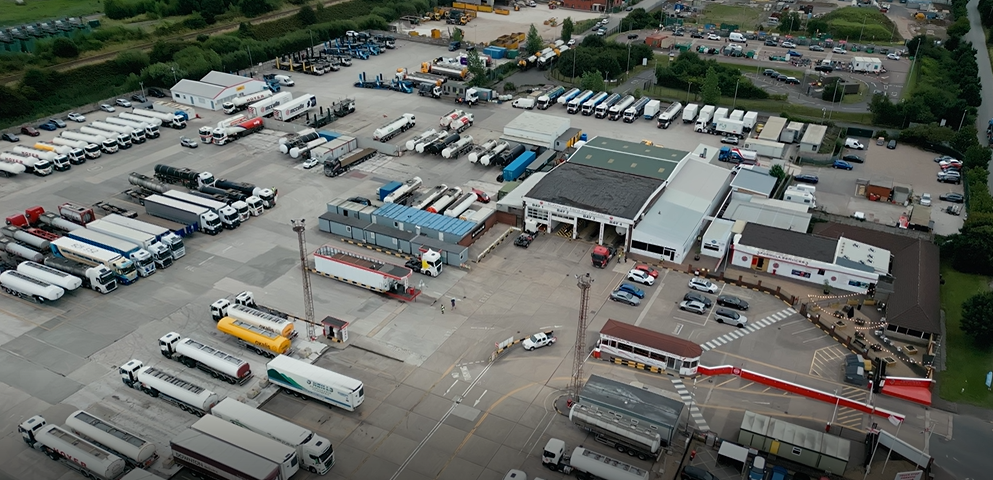
Josh Cousens
Úloha správy vozového parku v nákladní dopravě: Proč je to důležité?
Vytvořeno: 26.02.2025
•
Aktualizováno: 26.02.2025
V rychle se měnícím světě mobility a silniční dopravy je efektivní správa vozového parku nezbytná pro udržení nákladních vozidel v pohybu, snížení nákladů a zvýšení efektivity.
Ať už provozujete malý vozový park, nebo řídíte velkou dopravní společnost, správný software pro správu vozového parku může změnit způsob, jakým společnosti řídí svá vozidla, řidiče a provozní náklady.
Udržování efektivity provozu
Správa vozového parku je klíčová pro zajištění toho, aby nákladní vozidla dorazila tam, kam potřebují, včas a hospodárně.
Správa vozového parku nákladních vozidel minimalizuje zpoždění a snižuje zbytečné výdaje sledováním výkonu vozidel, spotřeby paliva a činnosti řidičů.
Bez strukturovaného přístupu hrozí vozovým parkům problémy s výkonností, které mohou vést k vyšším provozním nákladům a nižší ziskovosti.
Jak správa vozového parku zvyšuje bezpečnost řidičů a dodržování předpisů?
Provozovatelé vozových parků mají velký zájem o pohodu řidičů. Dobře spravovaný vozový park však zajišťuje správnou údržbu vozidel, optimalizaci tras pro snížení únavy a dodržování předpisů.
Software pro správu vozového parku pomáhá podnikům sledovat chování řidičů, prosazovat bezpečnostní zásady a snižovat riziko nehod nebo sankcí za jejich nedodržení.
Jak může správa vozového parku snížit provozní náklady dopravních společností?
Mezi nejvýznamnější náklady v odvětví nákladní dopravy patří výdaje na pohonné hmoty, údržbu vozidel a prostoje.
Zavedení řešení pro správu vozového parku nákladních vozidel pomáhá provozovatelům sledovat spotřebu paliva, plánovat efektivní trasy a zajistit, aby vozidla byla servisována ve správný čas, čímž se předchází nákladným poruchám a neplánovaným opravám.
Díky správným údajům mohou manažeři vozových parků přijímat informovaná rozhodnutí, která sníží zbytečné výdaje a zlepší ziskovost.

Jak mohou systémy správy vozového parku podpořit udržitelnost v nákladní dopravě?
Udržitelnost se stává stále větší prioritou v celém odvětví dopravy. Systémy pro správu vozového parku umožňují provozovatelům sledovat emise, monitorovat účinnost paliva a zavádět ekologické způsoby jízdy, které snižují dopad na životní prostředí.
Flotily mohou využívat řešení založená na datech k provádění strategických úprav, které jsou v souladu s průmyslovými předpisy a firemními cíli udržitelnosti.
Jaké jsou největší problémy při rozšiřování vozového parku nákladních vozidel?
Rozšiřování vozového parku nákladních vozidel představuje výzvy, jako je zvládání zvýšené složitosti logistiky a udržení produktivity. Zde jsou některé výzvy, se kterými se vozové parky mohou při rozšiřování svého vozového parku setkat.
- S rostoucím vozovým parkem se pokročilé plánování, optimalizace tras a plánování údržby stávají nezbytnými, aby se zabránilo zpožděním a prostojům.
- S rozšiřováním vozového parku je navíc obtížnější zajistit konzistentní bezpečnostní standardy a předpisy, což zvyšuje riziko problémů a sankcí.
- Rozšiřování také vyžaduje značné investice do infrastruktury, jako je najímání a školení většího počtu řidičů a modernizace softwaru pro správu vozového parku.
Jak SNAP podporuje správu vozového parku
Ve společnosti SNAP rozumíme výzvám, kterým provozovatelé vozových parků čelí. Naše síť digitálních řešení pro odvětví mobility pomáhá podnikům zefektivnit jejich provoz a zvýšit bezpečnost a pohodlí řidičů.
Poskytujeme přístup k rostoucí síti parkovacích a mycích míst po celé Evropě a pomáháme vozovým parkům omezit neplánované zastávky, zvýšit produktivitu na trase a udržet nákladní vozidla v pohybu bez zpoždění.
S vývojem technologií pro správu vozového parku se snažíme poskytovat inovativní řešení, která podporují měnící se potřeby odvětví.
Software pro správu vozového parku a poznatky založené na datech pomáhají manažerům nákladní dopravy zefektivnit provoz, snížit výdaje a zajistit, aby jejich vozový park fungoval naplno.
Závěrečné myšlenky
Správa vozového parku je víc než jen sledování vozidel. Jde o přijímání strategických rozhodnutí s cílem zvýšit efektivitu, snížit rizika a podpořit dlouhodobý růst podniku.
Se správným přístupem ke správě vozového parku nákladních vozidel mohou provozovatelé překonat problémy v oboru a zajistit hladký chod svých vozových parků.
Hledáte další inovativní řešení pro správu vozového parku? Zjistěte, jak mohou služby společnosti SNAP optimalizovat váš provoz. Prozkoumejte naše řešení ještě dnes.



